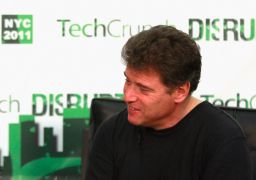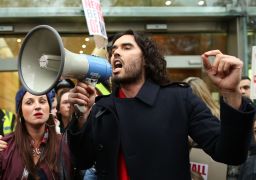Editor’s Note: Andrew Keen is a British-American entrepreneur, professional skeptic and the author of “The Cult of the Amateur”, “Digital Vertigo” and “The Internet Is Not The Answer.” The opinions expressed in this commentary are solely his.
Story highlights
Judging from apathy of young UK voters, Internet may be killing rather than resurrecting politics, writes Andrew Keen
Keen: Networked generation has outgrown old political parties with often rigidly ideological agendas
It's critical that young people in the UK become re-engaged with politics, he adds
Four years ago, in the full bloom of the Arab Spring and the Occupy movement, it was taken for granted that the Internet, through social media, was resurrecting politics. But today, with the withering away of both, the reverse seems to be true. Indeed, judging from the apathy of young UK voters toward next month’s election, the Internet may indeed be killing rather than resurrecting politics.
In the UK, everybody, especially the young, it seems, is aping the comedian Russell Brand and rejecting politics entirely. A Newsbeat report from last month found that half of 18-21-year-olds weren’t registered to vote and 60% were indifferent as to who wins next month’s election. This apathy is also reflected among black people and those of Asian origin in the UK, 20% of whom aren’t registered to vote.

You’d think that today’s UK digital natives – a generation so eager to comment on Facebook and Twitter ad nauseum and leave their plethora of selfies on Instagram – would be passionately involved in contemporary electoral politics. After all today’s issues – high unemployment, the ongoing storm over immigration and racism, the ISIS conflagration in the Middle East, above all the growing economic and cultural inequality between rich and poor – should have them keenly engaged in the political process.
But this 21st century networked generation has outgrown the old political parties with their often rigidly ideological agendas. One reason is a deep cynicism, a debilitating apathy about the power of traditional political parties to change the big issues.
“The parties seem quite ambitious on their pledges and I’m not sure the next government can make an ounce of difference to the problem,” thus one under-25-year-old explained to Helen Lewis, deputy editor of the left leaning weekly magazine, The New Statesman. “Frankly, I don’t think any petition I have ever signed has ever amounted to anything,” another 23 year-old confessed to Lewis.
This Facebook generation may become passionately involved in identity politics controversies such as whether one can be both Muslim and gay, the subject of a popular BBC3 show last year. But bigger and less personalized issues – complex questions about taxation, employment and wealth generation which shape national life – leave most of this generation cold.
The problem is that the highly individualized and personalized culture of the Internet – a consequence of the weakening of traditional 20th century institutions, from corporations to political parties – has changed young people’s sense not only of the centrality of themselves but also of the significance of political parties and institutions.
John F. Kennedy famously said in his January 1961 inaugural Presidential address: “My fellow Americans, ask not what your country can do for you, ask what you can do for your country.” But the individualized nature of our networked world, with its transformation of the self into the epistemological center of our existence – make countries and political parties extensions of our selves. Kennedy’s plea now sounds archaic – not just from another century, but from another planet.
Political parties have thus lost not only their relevance, but their logic to the digital generation. “Belonging to a political party is very old-fashioned,” one 24-year-old thus Londoner told The New Statesman’s Lewis.
“Apart from the expense, I think it is limiting. For instance, if I joined one party but my ideals or beliefs changed over time, would I have to leave the party? I’m not a member of any party. I’d be surprised if anyone you ask is. Joining a party is quite a statement – I stop being a voter in support and start being the party,” a 23-year-old Londoner, added.

In the minds of this younger generation, individuals have become more important than the legacy political parties with their ideological baggage that isn’t just limited to the self. And the political apps and web services designed for the UK’s election reflect the cultural transformation of the political citizen into the individualized consumer.
Internet products on the UK market like VoteMatch, PositionDial, Vote For Policies and TickBox are the political equivalents of Match.com or Tinder of our networked age. They connect individuals up with political parties to satisfy those individuals. They have no agenda, no perspective beyond the self(ie).
Ask not what you can do for you for your political parties, ask what these parties can do for you, VoteMatch, PositionDial, Vote For Policies and TickBox are all saying. No wonder young British voters are alienated, apathetic and atomized. No wonder they aren’t signing up to vote. No wonder they don’t care who wins the election.
So is the Internet really killing our politics? Certainly the Internet, with its individualization and personalization, is contributing to the crisis of many political parties – particularly in the UK. But amid all the doom and gloom, there is a glimmer of hope. The UK’s Green Party doubled in size last year, growing its membership from 22,000 to 44,000. While the appeal of the Scottish Nationalist Party (SNP) has dramatically increased since last year’s referendum vote and now boasts 100,000 members.
Both the success of the Greens and SNP – with their focus on broader technological and national issues – show that traditional political ideology can still triumph over the individualized and personalized nature of Internet culture. It’s critical that young people in the UK become re-engaged with politics. We know from history that an alienated and apathetic youth is dangerous for democracy. And it’s a fertile environment for mob politicians and rabble-rousers to prosper.

